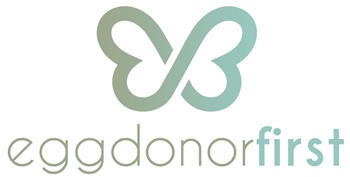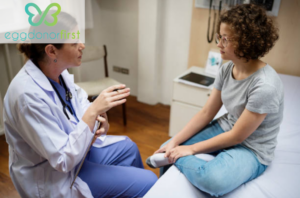Becoming an egg donor is a significant decision that allows you to help individuals and couples achieve their dreams of parenthood. This comprehensive guide will walk you through what to expect during the egg donation process, helping you make an informed decision about your journey.
Understanding Egg Donor Eligibility
Before beginning the donation process, you’ll need to meet certain eligibility requirements:
Basic Requirements
- Age: Typically between 21-29 years old
- Physical health: Good overall health with a BMI between 18-25
- Lifestyle: Non-smoker with no recreational drug use
- Medical history: No significant hereditary genetic conditions
- Education: Usually minimum of high school diploma
- Commitment: Ability to maintain appointments and follow medical protocols
The Step-by-Step Process
1. Initial Application and Screening
- Online application submission
- Personal and family medical history review
- Initial phone consultation
- Submission of photos and personal information
2. Medical Screening
- Physical examination
- Blood tests for:
- Infectious diseases
- Genetic disorders
- Hormone levels
- Ultrasound evaluation
- Drug screening
- Psychological evaluation
3. Legal Consultation
- Review of legal rights and responsibilities
- Understanding the donation contract
- Discussion of future contact preferences
- Signing necessary legal documentation
4. The Donation Cycle In Detail
- 1. Baseline Testing
- Occurs on day 2-3 of your menstrual cycle
- Includes transvaginal ultrasound and blood tests
- Begins birth control pills if tests are normal
- Birth control phase typically lasts 2-3 weeks
- Purpose: Prevent natural ovulation and help schedule donation cycle
- 2. Ovarian Suppression
- Follow-up ultrasound and blood tests near end of birth control
- Ensures all egg follicles are uniform in size
- Confirms birth control pills worked as intended
- Prepares ovaries for stimulation phase
- 3. Stimulation Phase (10-12 days)
- Begins approximately 4 days after last birth control pill
- Daily FSH (Follicle Stimulating Hormone) injections
- Purpose of FSH:
- Recruits multiple egg follicles to grow
- Uses eggs that would naturally be lost that month
- Does not affect your future fertility or egg reserve
- Monitoring includes:
- 4-5 clinic visits
- Regular ultrasounds
- Blood tests to adjust medication
- Close monitoring for side effects
- 4. Trigger Shot and Retrieval
- hCG (human chorionic gonadotropin) trigger shot
- Retrieval scheduled exactly 36 hours after trigger
- Procedure details:
- 15-minute outpatient procedure
- Intravenous sedation provided
- Transvaginal ultrasound-guided retrieval
- No general anesthesia required
- One-hour recovery period
- Transportation home required
Understanding the Safety Profile
1. Immediate Effects
- Mild cramping post-retrieval
- Period occurs 1-2 weeks after procedure
- Temporary tiredness and bloating during stimulation
- Some hormone-related mood changes possible
2. Long-Term Safety
- No known long-term side effects
- Over 20,000 donation cycles completed annually in US
- First successful egg donation birth: 1984
- No impact on future fertility
- No association with cancer risk
- No reduction in egg reserve
3. Potential Risks and Management
- Ovarian Hyperstimulation Syndrome (OHSS):
- Now rare with modern protocols
- Preventable through careful monitoring
- Manageable with early intervention
- Post-procedure precautions:
- Limited sexual activity temporarily
- Avoid alcohol
- Restrict high-impact exercise
- No extreme sports
Physical and Emotional Considerations
Physical Aspects
- Injection site soreness
- Bloating and mild discomfort
- Potential mood changes from hormones
- Recovery period of 5-7 days
Emotional Preparation
- Understanding the impact of hormonal changes
- Processing feelings about genetic connection
- Maintaining realistic expectations
- Utilizing available counseling services
Post-Donation Care
Immediate Recovery
- Rest for 24-48 hours post-retrieval
- Mild pain management if needed
- Monitor for any unusual symptoms
- Follow-up appointment scheduling
Activity Guidelines
- Gradual return to normal activities
- Specific restrictions for:
- Exercise (especially high-impact)
- Sexual activity
- Alcohol consumption
- Duration of restrictions typically 1-2 weeks
Medical Support
- 24/7 access to medical team
- Clear communication channels
- Regular check-ins during recovery
- Prompt attention to any concerns
Compensation and Financial Aspects
Standard Compensation
- Base compensation varies by region and experience
- Typically ranges from $5,000-$10,000
- Additional compensation for:
- Travel expenses
- Lost wages
- Medical insurance coverage
Payment Structure
- Initial deposit after starting medications
- Final payment after successful retrieval
- Coverage of all medical expenses
- Travel and accommodation reimbursement if applicable
Health and Safety Measures
During the Process
- Regular medical monitoring
- 24/7 access to medical staff
- Careful medication management
- Immediate attention to any concerns
After Retrieval
- Post-procedure care instructions
- Follow-up appointments
- Access to medical support
- Guidelines for resuming normal activities
Long-Term Considerations
Future Health
- No impact on future fertility
- Regular check-ups recommended
- Documentation of medical procedures
- Access to medical history records
Privacy and Disclosure
- Options for anonymity
- Future contact preferences
- Information sharing guidelines
- Medical history accessibility
Support Resources
Available Support
- Dedicated donor coordinators
- Mental health professionals
- Medical staff
- Legal advisors
- Support groups and online communities
Making Your Decision
Questions to Consider
- Are you comfortable with the medical procedures?
- Can you commit to the time requirements?
- Have you considered the emotional aspects?
- Are you prepared for the responsibility?
- Do you have a support system in place?
Next Steps
If you’re considering becoming an egg donor:
- Research reputable fertility clinics and agencies
- Schedule initial consultations
- Begin preliminary screening process
- Review legal and medical documentation
- Consider speaking with previous donors
Conclusion
Egg donation is a significant commitment that requires careful consideration of physical, emotional, and practical factors. Understanding the process helps ensure you’re making an informed decision about becoming a donor. Remember that every clinic and agency may have slightly different protocols, so always ask specific questions about their process during your consultation.
Your decision to become an egg donor can profoundly impact others’ lives while being a meaningful experience for you. Take time to carefully consider all aspects of the process and ensure you’re fully comfortable with your decision before proceeding.





